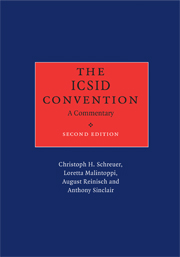Book contents
- Frontmatter
- Contents
- Foreword by Professor Sir Elihu Lauterpacht, CBE, QC
- Authors' preface to the second edition
- Table of cases
- List of abbreviations
- Text of the ICSID Convention
- Procedural calendar
- PREAMBLE
- CHAPTER I International Centre for Settlement of Investment Disputes
- Article 1 Establishment of Centre
- Article 2 Seat of Centre
- Article 3 Organization of Centre
- Article 4 Composition of Administrative Council
- Article 5 Chairman of Administrative Council
- Article 6 Functions of Administrative Council
- Article 7 Decisions of Administrative Council
- Article 8 No Remuneration for Members
- Article 9 Composition of Secretariat
- Article 10 Secretary-General and Deputy Secretary-General
- Article 11 Functions of Secretary-General
- Article 12 Panels of Conciliators and Arbitrators
- Article 13 Designation to Panels
- Article 14 Qualities of Panel Members
- Article 15 Periods of Office of Panel Members
- Article 16 Multiple Designations
- Article 17 Financing
- Article 18 Legal Personality of Centre
- Article 19 Immunities and Privileges of Centre
- Article 20 Immunity from Legal Process
- Article 21 Personal Immunities
- Article 22 Immunities of Parties and Witnesses
- Article 23 Archives and Communications
- Article 24 Tax Exemptions
- CHAPTER II Jurisdiction of the Centre
- CHAPTER III Conciliation
- CHAPTER IV Arbitration
- CHAPTER V Replacement and Disqualification of Conciliators and Arbitrators
- CHAPTER VI Cost of Proceedings
- CHAPTER VII Place of Proceedings
- CHAPTER VIII Disputes between Contracting States
- CHAPTER IX Amendment
- CHAPTER X Final Provisions
- Final Clause
- Consolidated bibliography
- Index by article
- Index by subject
Article 15 - Periods of Office of Panel Members
from CHAPTER I - International Centre for Settlement of Investment Disputes
Published online by Cambridge University Press: 07 September 2010
- Frontmatter
- Contents
- Foreword by Professor Sir Elihu Lauterpacht, CBE, QC
- Authors' preface to the second edition
- Table of cases
- List of abbreviations
- Text of the ICSID Convention
- Procedural calendar
- PREAMBLE
- CHAPTER I International Centre for Settlement of Investment Disputes
- Article 1 Establishment of Centre
- Article 2 Seat of Centre
- Article 3 Organization of Centre
- Article 4 Composition of Administrative Council
- Article 5 Chairman of Administrative Council
- Article 6 Functions of Administrative Council
- Article 7 Decisions of Administrative Council
- Article 8 No Remuneration for Members
- Article 9 Composition of Secretariat
- Article 10 Secretary-General and Deputy Secretary-General
- Article 11 Functions of Secretary-General
- Article 12 Panels of Conciliators and Arbitrators
- Article 13 Designation to Panels
- Article 14 Qualities of Panel Members
- Article 15 Periods of Office of Panel Members
- Article 16 Multiple Designations
- Article 17 Financing
- Article 18 Legal Personality of Centre
- Article 19 Immunities and Privileges of Centre
- Article 20 Immunity from Legal Process
- Article 21 Personal Immunities
- Article 22 Immunities of Parties and Witnesses
- Article 23 Archives and Communications
- Article 24 Tax Exemptions
- CHAPTER II Jurisdiction of the Centre
- CHAPTER III Conciliation
- CHAPTER IV Arbitration
- CHAPTER V Replacement and Disqualification of Conciliators and Arbitrators
- CHAPTER VI Cost of Proceedings
- CHAPTER VII Place of Proceedings
- CHAPTER VIII Disputes between Contracting States
- CHAPTER IX Amendment
- CHAPTER X Final Provisions
- Final Clause
- Consolidated bibliography
- Index by article
- Index by subject
Summary
Art. 15 deals with the duration of service and consequences of a vacancy on the Panels.
The earlier drafts provided for four years of service on the Panels (History, Vol. I, pp. 76, 78). There were several suggestions that this term be extended. Eventually, it was fixed at six years with a possibility of renewal (History, Vol. II, pp. 144, 385, 386, 489, 562, 662, 722, 730, 731, 753, 935).
The Convention does not explicitly address the possibility of a removal or replacement of a Panel member before the expiry of the six years of service. During the Convention's drafting, there was a suggestion that Panel members should only serve “subject to the pleasure” of the designating authority; in other words, that the designation could be terminated at any time. Other delegates saw a danger to the independence of Panel members in this proposal. The idea to allow the removal of Panel members during their period of service was defeated in two votes (History, Vol. II, pp. 487–489, 562, 730–732). The peremptory language of Art. 15(1) (“shall serve for … six years”) also supports the interpretation that, once designated, a Panel member may not be withdrawn by the designating authority (see Art. 16, para. 6).
- Type
- Chapter
- Information
- The ICSID ConventionA Commentary, pp. 52 - 53Publisher: Cambridge University PressPrint publication year: 2009



